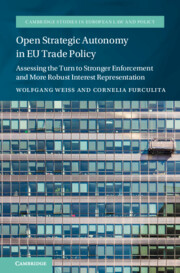 Open Strategic Autonomy in EU Trade Policy
Open Strategic Autonomy in EU Trade Policy Newfound Strength?
from Part II - The Tools for Stronger Enforcement of Trade Rights
Published online by Cambridge University Press: 29 November 2024
Chapter 7 focuses on the enforcement of the FTA Trade and Sustainable Development (TSD) chapters and EU’s plan to strengthen it. It introduces the reader to the EU’s former cooperative approach and the long-lasting debate on the use of sanctions. It follows with an analysis of the newly found robustness of EU’s approach towards TSD enforcement, by assessing the recent EU–Korea FTA labour dispute and presenting the EU’s new TSD enforcement approach, which extends the coverage of general dispute settlement compliance stage to TSD chapters and adds the possibility to impose sanctions in case of certain TSD breaches. It continues with an analysis of the available tools in case of non-compliance even in case of an express FTA legal basis for sanctions. In particular, it explores whether the EU could make use of international customary rules enshrined in the ILC Draft Articles on State Responsibility, Vienna Convention on the Law of Treaties, or the ’Essential Elements’ Clauses from EU FTAs and Framework Agreements. Finally, the chapter presents other pertinent political considerations and evaluates the latest developments in strengthening the enforcement of EU’s FTA TSD chapters.
To save this book to your Kindle, first ensure [email protected] is added to your Approved Personal Document E-mail List under your Personal Document Settings on the Manage Your Content and Devices page of your Amazon account. Then enter the ‘name’ part of your Kindle email address below. Find out more about saving to your Kindle.
Note you can select to save to either the @free.kindle.com or @kindle.com variations. ‘@free.kindle.com’ emails are free but can only be saved to your device when it is connected to wi-fi. ‘@kindle.com’ emails can be delivered even when you are not connected to wi-fi, but note that service fees apply.
Find out more about the Kindle Personal Document Service.
To save content items to your account, please confirm that you agree to abide by our usage policies. If this is the first time you use this feature, you will be asked to authorise Cambridge Core to connect with your account. Find out more about saving content to Dropbox.
To save content items to your account, please confirm that you agree to abide by our usage policies. If this is the first time you use this feature, you will be asked to authorise Cambridge Core to connect with your account. Find out more about saving content to Google Drive.